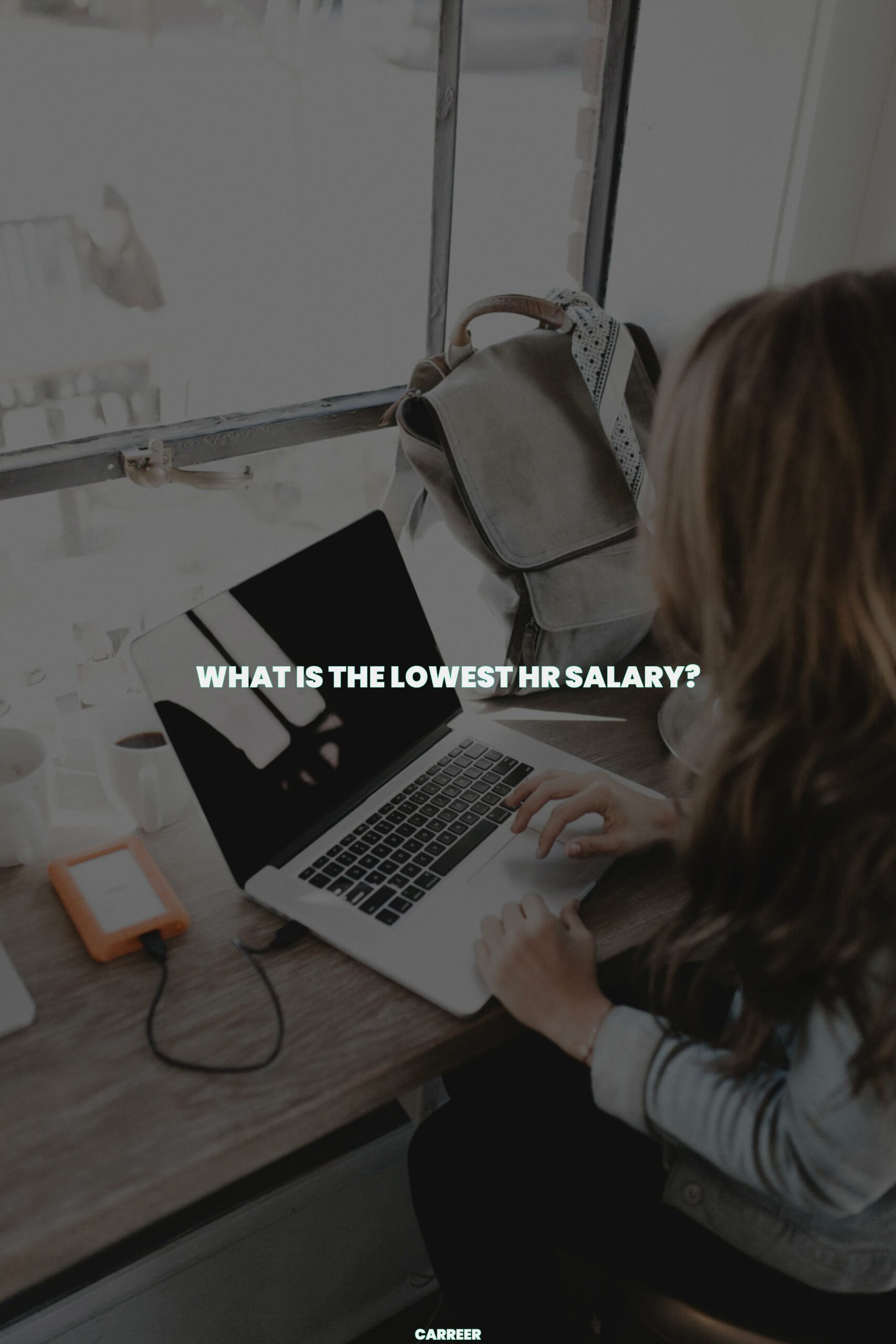HR
Which field in HR pays the most?

As a Human Resources professional, you have the exciting and fulfilling job of managing and developing talent, ensuring safety, and providing benefits and compensation for employees. With the high demand for HR positions, you may be wondering which field in HR pays the most and if you can make a six-figure salary in HR.
When it comes to HR, the industry you work in can make a difference in your salary. Industries such as banking and finance, consulting, and healthcare are often the highest paying. However, even small organizations or those in the public sector can offer competitive salaries.
The amount of money you make per hour also plays a role. For example, if you make $10 per hour, you can expect to make around $20,000 per year. However, with a higher salary, you can earn much more than that.
So, is HR a high-paying field? The answer is yes. HR professionals earn an average of $67,000 per year, according to the Bureau of Labor Statistics. With the right qualifications, experience, and dedication to the profession, you can make six figures in HR.
However, it’s important to understand that HR is not just about money. It can be a stressful job, and you need to be prepared for the long hours and intense work environment. You must also possess a deep understanding of the nuances of managing people and building relationships. With the right attitude and dedication, you can make a successful career in HR and make an impact in the lives of people you work with.
Which field in hr pays the most?
Human Resource (HR) is a rapidly growing profession, with more organizations recognizing the value of having an experienced team of professionals to manage and develop their talent. As the demand for HR professionals rises, so does the potential for lucrative career opportunities. While pay is only one consideration when choosing a job in the HR field, some of the highest paying HR jobs are also the most rewarding in terms of professional development and job satisfaction.
Compensation Manager is one of the highest paying HR jobs. In this position, you’ll be responsible for creating and managing the compensation system for the organization. You’ll be in charge of evaluating and determining salary ranges, crafting incentive plans, and developing employee benefits packages. Compensation Managers also work closely with other HR teams to ensure that employees are paid fairly and competitively.
Human Resource Director is another high-paying HR role. In this role, you’ll be responsible for overseeing the entire HR team and developing strategies to ensure that the organization’s HR goals are met. You’ll be in charge of recruiting, performance management, training and development, and labor relations. Human Resource Directors also work closely with other departments to ensure that the organization’s goals are met.
HR Analytics Manager is another high-paying job in the HR field. In this role, you’ll be responsible for analyzing data related to the organization’s HR strategies and activities. You’ll be in charge of creating reports, analyzing trends, and making recommendations to improve HR processes and strategies. HR Analytics Managers also work closely with other departments to ensure that the organization is able to make data-driven decisions.
Employee Relations Manager is another high-paying job in the HR field. In this role, you’ll be responsible for overseeing the organization’s employee relations programs. You’ll be in charge of developing and implementing policies and procedures, addressing employee concerns, and resolving conflicts. Employee Relations Managers also work closely with other departments to ensure that the organization’s employee relations goals are met.
While pay is an important consideration when choosing a job in HR, it’s not the only one. HR professionals want to work at organizations that care about people and have mature and strategic processes to manage and develop talent. And HR professionals are more likely to expect structured career pathing with tiered positions, where the compensation adjusts alongside performance, increased responsibility and tenure.
No matter which of the highest paying HR jobs you choose, it’s important to remember that the HR profession now requires new ways of working in the organizations that creates sustainability for organizations and their people. To ensure success and job satisfaction, HR professionals need to stay up to date on the latest trends in the field and be willing to explore new opportunities. With the right attitude and dedication, you can find a rewarding and lucrative career in the HR field.
Can you make 6 figures in HR?
Yes, it is possible to make six figures in Human Resources (HR). According to the Bureau of Labor Statistics (BLS), HR specialists earn a median salary of $59,180 and HR Managers an impressive $106,910—far above the cross-industry median of $44,668. Namely’s database of over 1,000 companies showed that the average HR salary across all levels of experience was $98,048.
However, the size of the HR team plays a role in salaries. Typically, there is a ratio of three HR employees for every 100 employees. So a company in the ‘sweet spot’ may only have one or two people leading the core HR function. This means that job titles deemed “mid-level” may actually represent the most senior HR roles within the company.
If you’re looking to increase your HR salary, there are several ways to do so. One of the most effective is to gain a certification. Depending on the type of certification you choose, you may be able to increase your earning potential by several thousand dollars. For example, a Professional in Human Resources (PHR) certification may increase your salary by up to $7,000.
Experience also counts. The more experience you have in the field, the more valuable you become to employers. This is especially true if you have experience in multiple areas of HR. For example, if you have experience in HR policy, recruitment and employee relations, you are likely to be more attractive to employers and command a higher salary.
A master’s degree can also help you increase your HR salary. Many employers prefer to hire candidates with a master’s degree in Human Resources. Having an advanced degree may not only increase your salary, but also make you eligible for promotions.
Finally, it’s important to remember that you can increase your HR salary by switching jobs. You may be able to negotiate a higher salary if you apply for a job at a larger company or in a different industry.
In conclusion, it is possible to make six figures in Human Resources. Gaining certifications, gaining experience, and obtaining a master’s degree can all help you increase your HR salary. Additionally, switching jobs may also be a viable option for those looking to increase their earning potential.
Which industry is best for HR?
If you’re considering a career in Human Resources, you may be wondering which industry is best to work in. With Human Resources being relevant to every industry, some industries offer more competitive salaries and more opportunities for growth.
The banking and finance industry is highly structured, with strong people practices and systems in place. This makes it an ideal place to start your HR career, as you’ll get good quality training and experience that can translate into other fields. Plus, you’ll have plenty of opportunities to specialize in an area that suits you.
The aviation industry is another great place to look for an HR career. With the increasing demand for air travel, there are lots of opportunities for HR professionals to help companies manage their staff and ensure they have the right people in the right roles.
The health sector is also a great option for HR professionals. With the complexity of the healthcare system, HR professionals can help organizations ensure they have the best people in the right roles, and ensure staff are well-trained and knowledgeable about the latest healthcare trends.
The retail industry is another great choice for HR professionals. With the ever-changing retail landscape, HR professionals can help organizations stay on top of their staffing needs, as well as their customer service needs. Plus, they can help companies ensure they have the right people in the right roles, and ensure staff have the necessary training and experience to provide the best customer service.
Finally, the hospitality industry is a great place to look for an HR career. With the increasing demand for travel and tourism, HR professionals can help organizations ensure they have the right people in the right roles, and ensure staff have the necessary training and experience to provide the best customer service.
No matter which industry you decide to pursue an HR career in, there are lots of opportunities for growth and development. With the right training and experience, you can become an expert in the field and help organizations meet their staffing needs.
Overall, the best industry for HR is one that offers good training, experience and career opportunities. By researching the industry and the roles available, you can find the best fit for your skills and interests. It is also important to look for industries that are highly structured and have strong people practices and systems in place. This will ensure you get the best training and experience in the field.
How much does $10/hr make a year?
If you’re wondering how much money you could make working part-time at $10 an hour, then you’re in the right place. We’ll answer the question: how much does $10/hr make a year?
First, let’s look at how much you would be earning part-time by multiplying 20 hours a week by $10, which is $200 every week in income. That comes out to an annual salary of $20,800 if you work 52 weeks a year.
But if you’re only working 50 weeks a year, your annual salary would be closer to $20,000. And if you’re working 262 days a year, your total income would be $20,960.
Let’s break it down even further. Working 175 hours a month would give you a monthly income of $1,750. Working 40 hours a week will give you a weekly income of $400. And if you work 8 hours a day, you will make $80 a day.
Now that we’ve discussed how much you can make, let’s look at how a typical budget might look if you’re making $10 an hour. For example, you might set aside $400 every week for rent, groceries, utilities, and other bills. This would leave you with a monthly take-home pay of about $1,455.
It’s important to remember that these are just estimates. Depending on your situation, you may need to adjust your budget accordingly. For instance, if you have debt payments or additional expenses, you may need to cut back on other areas of your budget to cover them.
In conclusion, if you’re making $10 an hour, you should be able to make around $20,800 a year if you work 52 weeks. For a more accurate estimate, you can use the table above to calculate your yearly, monthly, weekly, and daily income. It’s also important to create a budget that works for your lifestyle and financial goals.
By understanding how much you can make at $10 an hour and properly budgeting your income, you can increase your overall financial security.
Is HR a high paying field?
Human Resource (HR) is a rapidly growing profession that has seen a surge in demand over the past few years. Nowadays, HR jobs are not only rewarding in terms of career development and job satisfaction, but they can also lead you to a lucrative career. HR professionals are responsible for a variety of tasks, from manpower planning and job analysis to employee sourcing and recruitment, onboarding and training, performance management, compensation and benefits, and building industrial relations.
If you’re looking for a high-paying job in the HR field, here are some of the top-earning positions you can pursue.
Chief Human Resources Officer
Chief Human Resources Officers (CHROs) are the top-level decision makers in the HR department. As such, they are responsible for leading the development and implementation of HR strategies and policies that support the company’s overall objectives. They also oversee recruitment, performance management, employee relations, and compensation and benefits. On average, CHROs make around $150,000 a year.
Senior Human Resources Manager
Senior Human Resources Managers are responsible for overseeing the HR department and ensuring that the organization’s HR goals are met. They are also in charge of recruiting, training, and evaluating employees. Senior HR Managers typically make around $120,000 a year.
Compensation and Benefits Manager
Compensation and Benefits Managers are responsible for developing, implementing, and managing compensation and benefit plans for the organization. They also conduct research to stay up to date on industry trends and ensure compliance with state and federal regulations. On average, Compensation and Benefits Managers make around $110,000 a year.
Employee Relations Manager
Employee Relations Managers are responsible for managing employee relations and resolving any conflicts that may arise between employees. They are also responsible for developing and implementing policies and procedures that ensure a positive and productive work environment. Employee Relations Managers typically make around $90,000 a year.
Recruiting Manager
Recruiting Managers are responsible for overseeing the recruiting process and ensuring that the organization has the right talent in place. They are in charge of setting recruiting goals, developing recruitment strategies, and managing the recruitment team. Recruiting Managers typically make around $85,000 a year.
Overall, HR is a high-paying field with many opportunities to make a lucrative career. Whether you’re looking to become a Chief Human Resources Officer or a Recruiting Manager, there are plenty of opportunities to make a good living in the HR field.
Is HR a stressful job?
Working in Human Resources (HR) is undoubtedly one of the most stressful jobs around. HR professionals are responsible for a wide range of tasks and must be able to multi-task and stay organized while dealing with difficult people.
One of the most significant responsibilities an HR manager has is to deal with any challenging employees.The way these employees behave can slow down the entire team and can sap the team’s morale, so they must be dealt with immediately and effectively.However, working with negative people can be pretty draining and stressful.It can take a long time to deal effectively with difficult employees, and it involves learning their strengths and weaknesses, working out potential problems and solutions, and much more.This time consuming and the emotionally exhausting process is one of the most significant factors why working in HR is so stressful.
Terminating Employees can be stressful. No one likes to have to let someone go, and HR managers are often tasked with this unpleasant job. It can be hard to have to make the decision to fire someone, even if it is necessary. HR managers must be careful to avoid any discrimination or wrongful termination, and this can add to the stress of the situation.
Hiring and recruiting is another challenging part of the job. HR managers must be able to quickly identify the right person for the job and make sure they offer the right salary and benefits. This can be a time-consuming process and it can be difficult to find the right person for the job.
On top of all of these tasks, HR managers are also responsible for staying up to date with the ever-changing laws and regulations that affect their role. They must be able to quickly adapt to new laws and make sure that the organization is compliant. This can be a challenging task, and it can add to the overall stress of the job.
Overall, working in HR can be a challenging and stressful job. It requires a lot of patience, knowledge, and dedication to be successful. HR professionals must be able to handle difficult people, make difficult decisions, and stay up to date with the laws. It is a job that requires a lot of hard work and can be emotionally and mentally draining.

HR
What are 3 different types of hris?

Employee management is a critical part of any organization’s success. It’s essential to have a system in place that is efficient and effective when it comes to employee management and Human Resources Information Systems (HRIS) are the answer! HRIS provide organizations with the ability to manage employee data, payroll, and other important aspects of personnel management. But with so many different types of HRIS available, which one is the best for your organization?
In this blog post, we’ll be exploring the three main types of HRIS: Operational HRIS, Human Capital Management (HCM) and Human Resource Management System (HRMS). We’ll be looking at the differences between them, what features they offer, and what applications they can be used for. Additionally, we’ll be discussing the five most popular applications of an HRIS and which HRIS systems companies are using.
By the end of this blog post, you’ll have a better understanding of the different types of HRIS systems and the features they offer. You’ll also have a good idea of what HRIS systems companies are using and the most popular applications of an HRIS. So let’s get started!
What are 3 different types of hris?
Human Resource Information Systems (HRIS) are essential tools for modern businesses, providing a powerful way to manage people, policies, and procedures. While there are many different HRIS systems and modules, they can generally be categorized into four types according to their functionality. Let’s explore these four types of HRIS and learn how they can help businesses make better decisions.
1. Operational HRIS
Operational HRIS are designed to handle day-to-day tasks such as managing employee records, tracking attendance, and managing payroll. These systems are typically used by HR staff to ensure that the organization is running efficiently and that employees are being treated fairly. Operational HRIS also provide a way to track performance, allowing managers to monitor the progress of employees and make changes as needed.
2. Analytic HRIS
Analytic HRIS are used to analyze and report on the data generated by operational HRIS. These systems provide detailed insights into employee performance, helping managers to identify strengths and weaknesses in their workforce. Analytic HRIS also provide a way to measure the effectiveness of HR policies and programs, allowing organizations to adjust them as needed.
3. Strategic HRIS
Strategic HRIS are designed to help organizations make better decisions about their workforce and human resources. These systems provide insights into the workforce, helping organizations to understand their competitive environment, identify areas of improvement, and develop strategies to attract and retain talent.
4. Collaborative HRIS
Collaborative HRIS are designed to facilitate communication and collaboration between HR staff, managers, and employees. These systems provide a platform for employees to share ideas and feedback, allowing organizations to get a better understanding of their employees and to make better decisions.
In summary, there are four types of HRIS systems: Operational HRIS, Analytic HRIS, Strategic HRIS, and Collaborative HRIS. Each type of system provides a different set of features and capabilities that can help organizations make better decisions about their workforce and human resources.
What are some examples of HRIS?
Human Resources Information System (HRIS) is an integrated system that automates and streamlines the processes related to human resources, payroll, benefits and other HR activities. It helps businesses manage, track and update employee data, as well as process and analyze the information for better decision-making.
An HRIS can be a standalone system, or it can be integrated with other systems such as ERP, CRM and payroll. HRIS solutions range from simple, easy-to-use cloud-based systems to complex, highly customizable on-premise systems.
If you’re looking for an HRIS solution for your business, there are many options to choose from. Here are some examples of popular HRIS systems:
1. ADP: ADP is a global provider of cloud-based HRIS and HCM solutions that unify payroll, time tracking, HR services, talent management, and tax and benefits administration. It offers a range of tools to help businesses manage their workforce, including recruitment, onboarding, performance management, and compliance.
2. Workday: Workday is a cloud-based HRIS that helps businesses manage and track employee data, payroll, and benefits. It also provides analytics and insights to help businesses make better decisions.
3. Oracle: Oracle is a comprehensive HRIS solution designed to help businesses manage their entire HR operations from recruitment to retirement. It offers a range of features such as employee self-service, performance management, and analytics.
4. SAP: SAP is a powerful HRIS solution that helps businesses manage their entire HR operations, from recruitment to retirement. It offers a range of features, including employee self-service, analytics, and performance management.
5. PeopleSoft: PeopleSoft is an enterprise-level HRIS that helps businesses manage their entire HR operations. It provides a range of features, including employee self-service, analytics, and performance management.
6. UltiPro: UltiPro is a cloud-based HRIS that helps businesses manage their entire HR operations, from recruitment to retirement. It offers a range of features, including employee self-service, analytics, and performance management.
These are just a few examples of popular HRIS solutions. There are many other HRIS solutions available, so it’s important to do your research and find the one that best fits your business needs.
An HRIS can help businesses save time, reduce costs, and improve the efficiency of their HR operations. It can also help them make better decisions, improve employee engagement, and ensure compliance with labor and tax laws.
Whether you’re looking for an on-premise or cloud-based HRIS solution, make sure to do your research and find the one that best fits your business needs. With the right HRIS in place, you can ensure that your HR operations are running smoothly and efficiently.
What are two types of HRIS?
Human Resource Information Systems (HRIS) are essential tools for modern businesses. HRIS systems offer a range of functions to help employers better manage their workforce and improve operational efficiency. But what types of HRIS systems are there and how do they differ?
The two main types of HRIS are operational HRIS and strategic HRIS. Operational HRIS are used to handle day-to-day administrative tasks such as payroll and attendance, while strategic HRIS provides more strategic insights and analytics into how the business is performing.
Operational HRIS is used for the management of daily HR tasks such as payroll, benefits administration, employee attendance, and time tracking. This type of HRIS system is usually easy to use and has a user-friendly interface, making it ideal for HR departments with limited IT resources.
Operational HRIS systems can also be used to automate employee onboarding and offboarding processes, as well as generate reports on employees’ performance and attendance. Some systems even offer access to employee self-service portals, allowing employees to update their own personal information and view their payslips.
Strategic HRIS is used to provide more strategic insights into how the business is performing. Strategic HRIS systems provide analytics and insights into areas such as workforce planning, recruitment and selection, succession planning, and training and development.
Strategic HRIS systems are often integrated with other software systems such as Customer Relationship Management (CRM) and Enterprise Resource Planning (ERP) systems. This allows employers to gain deeper insights into the performance of their workforce and identify areas for improvement.
In conclusion, there are two main types of HRIS systems: operational and strategic. Operational HRIS systems are used for the management of daily HR tasks, while strategic HRIS systems are used to provide more strategic insights into how the business is performing. Both types of HRIS systems are essential tools for modern businesses and can help employers better manage their workforce and improve operational efficiency.
What are the five most popular applications of an HRIS?
Human Resources Information Systems (HRIS) are important tools for businesses of all sizes. They provide a centralized database to store information and automate processes, improve accuracy, and save time. With a comprehensive HRIS, businesses can streamline their HR operations, reduce costs, and drive better results.
The five most popular applications of an HRIS are: recruiting and onboarding, payroll and benefits administration, performance management, time tracking, and workforce analytics.
Recruiting and onboarding is one of the most important functions of an HRIS. It helps businesses quickly and efficiently manage the recruitment process, from job postings to onboarding new hires. It also includes applicant tracking, resume screening, and interview scheduling.
Payroll and benefits administration is another popular application of an HRIS. It automates the payroll process, allowing businesses to quickly and accurately process payroll and manage employee benefits. It can also provide employees with self-service options for viewing and updating their personal information.
Performance management is an important HRIS application that helps businesses track and assess employee performance. It can be used to set objectives, measure progress, provide feedback, and reward performance.
Time tracking is a popular application of an HRIS. It helps businesses track employee attendance, vacation time, and sick days. It can also be used to generate detailed reports on employee productivity and time management.
Workforce analytics is another popular application of an HRIS. This feature allows businesses to collect and analyze data about their workforce. It can be used to identify trends, identify areas of improvement, and make more informed decisions about staffing and operations.
Choosing the right HRIS for your business can be tricky. It’s important to consider your business’s needs, budget, and available resources when selecting a system. There are a variety of HRIS solutions available, so take the time to evaluate the features and determine which one is best suited for your business.
What are considered HRIS systems?
Human Resources Information Systems (HRIS) are systems used to collect, store, and manage data related to an organization’s workforce. They are used to track employee information such as payroll, benefits, time & attendance, training, performance management, and employee self-service. HRIS systems provide a comprehensive view of an organization’s human capital and enable HR teams to make informed decisions.
HRIS systems are designed to help streamline processes, reduce errors, and save time. They provide a single source of truth for all employee data, allowing HR teams to easily access and manage employee information in one place. HRIS systems also enable organizations to quickly generate reports and analytics based on employee data.
HRIS systems can be cloud-based or on-premise. Cloud-based HRIS systems are hosted in the cloud and are accessed via the internet. On-premise HRIS systems are installed on the organization’s computer systems, providing more control and customization.
HRIS systems can also include features such as Applicant Tracking Systems (ATS), which allow organizations to manage the recruitment process. They can also include payroll systems, which are used to manage employee salaries and wages. Additionally, HRIS systems can include Learning Management Systems (LMS) which are used to manage employee training and development.
In addition to the standard features, many HRIS systems also include additional features such as analytics and reporting, employee engagement, and employee self-service. Analytics and reporting allow organizations to track employee performance and progress. Employee engagement features enable organizations to measure and improve employee morale. Employee self-service features allow employees to access their own HR information and manage their own benefits.
HRIS systems are becoming increasingly popular and are being adopted by organizations of all sizes. They provide organizations with a comprehensive view of their human capital and enable HR teams to make informed decisions. They also streamline processes, reduce errors, and save time. If you’re looking for a way to maximize the efficiency of your HR processes, consider implementing an HRIS system.
What HRIS systems do companies use?
Organizations of all sizes rely on HRIS systems to manage their human resources and data efficiently, and this is especially true of enterprises that are seeking to grow, expand geographically or pursue mergers and acquisitions. An HRIS, or Human Resource Information System, is a type of software that allows HR teams to streamline and optimize processes related to employee data, payroll, time tracking, HR services, talent management, and tax and benefits administration.
With an HRIS, HR teams can increase productivity and improve employee retention, while also monitoring company culture. There are three main types of HRIS systems: HRMS (Human Resource Management System), HRIS (Human Resource Information System), and HCM (Human Capital Management). Each of these systems has different features and capabilities, so it’s important to understand the differences between them before implementation.
For example, ADP is a global provider of cloud-based HRIS and HCM solutions that unify payroll, time tracking, HR services, talent management, and tax and benefits administration. While ADP is a popular HRIS, it’s not the only option for businesses. There are a variety of HRIS solutions that can suit different businesses, depending on the features and capabilities required by the organization.
No matter the industry, HRIS technology can be adopted by any company that wishes to improve employee experience and make tedious HR tasks simpler. By automating HR processes, organizations can save time and resources while providing better service and more accurate data to their employees. Additionally, an HRIS allows HR teams to gain insight into employee performance and engagement, helping to improve employee retention and productivity.
All in all, HRIS systems are an essential part of any organization’s HR operations. By understanding the differences between the different types of HRIS systems and how they work, businesses can make sure they are selecting the best option to meet their needs. With the right HRIS system, businesses can streamline their HR processes and gain insight into their employees, improving employee experience and company performance.
HR
Is HR analyst a stressful job?

HR is one of the most important components of any organization. It is the one responsible for ensuring that employees are taken care of and that the company is compliant with all the laws and regulations. As such, it can be quite a stressful job. From dealing with difficult employees, to implementing policies and procedures, to dealing with compliance issues, HR professionals have a lot to handle.
But how stressful is the job of an HR analyst? Is this position really as demanding as it seems? To answer this question, we must look at the job role itself. An HR analyst is responsible for analyzing and interpreting data to help the company understand employee behaviors and identify potential problems. They must also be able to identify trends within the company and recommend solutions to improve the workplace environment.
The job of an HR analyst can be quite stressful. Not only do they have to manage the data and interpret it, but they must also be able to identify any issues that might arise within the workplace. They must be able to assess and resolve any issues in a timely manner. They must also be able to effectively communicate their findings to management and other stakeholders.
Aside from the stress of managing and interpreting data, HR analysts also have to handle the difficult and emotionally draining task of dealing with employees. This includes dealing with difficult employees, managing performance issues, and confronting any potential violations of company policies. It can be a taxing job that requires a great deal of patience and diplomacy.
So, is HR analyst a stressful job? The answer is yes. It can be quite demanding and requires a great deal of skill and experience. However, with the right combination of knowledge, experience, and interpersonal skills, HR analysts can be successful in their role and make a positive impact on the organization.
Is hr analyst a stressful job?
Yes, HR is a stressful job. Working in Human Resources (HR) can be very demanding, particularly for management level professionals, due to their efforts to comply with company policies and governmental laws. A survey of Human Resources professionals revealed that 90% of them reported that their stress has increased in the last five years.
One of the most significant responsibilities an HR manager has is to deal with any challenging employees. The way these employees behave can slow down the entire team and can sap the team’s morale, so they must be dealt with immediately and effectively. However, working with negative people can be pretty draining and stressful. It can take a long time to deal effectively with difficult employees, and it involves learning their strengths and weaknesses, working out potential problems and solutions, and much more. This time consuming and the emotionally exhausting process is one of the most significant factors why working in HR is so stressful.
In addition, HR managers may also be responsible for terminating employees. This can be a very stressful process, as it involves making difficult decisions and facing difficult conversations. It is also important for HR managers to maintain a professional stance and ensure that all the legal guidelines are followed during the termination process.
Moreover, HR managers may also need to manage training and development programs. This is a very important part of HR management, as it helps the company maintain a motivated and skilled workforce. However, it can be very demanding and stressful for HR managers as they have to ensure that all the training and development programs are effective and beneficial for the employees.
Overall, HR managers have a lot of responsibilities and they must be able to handle stressful situations. Working in Human Resources requires strong problem-solving skills, organizational skills, and people skills. It is important to remember that HR managers play a key role in the success of any organization, and they must be able to work effectively under pressure. Therefore, HR analyst is a stressful job that requires a lot of dedication and commitment.
What are the top 3 most stressful jobs?
No one wants to be stuck in a job that causes them immense stress, but unfortunately, some jobs are more taxing than others. If you’re considering a career change, it’s important to know which roles are the most stressful.
According to the Occupational Information Network (O*NET), a part of the U.S. Department of Labor, 873 of the most stressful jobs in the country have been ranked. The top three most stressful jobs are enlisted military personnel, firefighters, and airline pilots.
For enlisted military personnel, their job involves intense physical and mental stress. The dangers of working in a combat zone are very real, and soldiers are responsible for their own safety as well as the safety of their comrades. In addition, they are away from their families for long periods of time, and must carry out orders without fail.
Firefighters must also face immense physical and mental stress. In addition to the physical strain of carrying heavy equipment and crawling through tight spaces, they are exposed to hazardous materials and are often the first ones to respond to a crisis. Firefighting is a highly dangerous job, as firefighters must risk their own lives to save others.
Airline pilots also face a great deal of stress. They are responsible for the safety of their passengers, and must be alert and prepared at all times. They must also be able to respond quickly to any potential problems that may arise, and make split-second decisions that could mean the difference between life and death.
It’s important to remember that these are just three of the most stressful jobs. Many other roles, such as police officers and surgeons, can also be highly stressful. Before making a career decision, it’s a good idea to take into account the level of stress that comes with the job.
While it is impossible to completely eliminate stress from the workplace, it is possible to make changes to reduce the amount of stress you feel. Taking regular breaks, getting enough sleep, and learning to manage your stress levels can all help. Additionally, it’s important to recognize when you are feeling overwhelmed and to take a step back to recharge.
No matter what job you choose, it’s important to remember that stress is a normal part of life. By learning how to manage it, you can make sure that your job is as enjoyable as possible.
Is HR good for introverts?
HR is often thought of as a career that requires extroverts, but introverts can also find success in human resources. With the right job, introverts can use their natural strengths and talents to thrive in the HR field.
Prepare and Practice: As an introvert, you may prefer to think things through before speaking. You may also need some extra time to come up with the right answers during interviews or presentations. To get the most out of these situations, make sure you take the time to prepare and practice. Anticipate the questions that may be asked and practice responding to them. This will help you feel more confident in your answers and more comfortable in the situation.
Be Selective: Not all HR jobs are created equal. If you’re an introvert, it’s important to be selective when choosing a job. Look for positions that involve more independent work and fewer meetings. Look for opportunities that allow you to work from home or remotely. Consider jobs that involve data analysis, writing, and research, as these are tasks that introverts may find more enjoyable and less stressful.
Network Strategically: Networking is key to success in HR, but it doesn’t have to be overwhelming for introverts. You can still make valuable connections without spending hours in a room full of people. Start by attending smaller, more intimate networking events. Look for online networking opportunities or join a professional group in your area to connect with like-minded people.
Talk to Others: While it may not be your favorite activity, talking to people is an important part of most HR jobs. As an introvert, you can use your natural tendency to listen and observe to your advantage. Take the time to really listen to people and ask thoughtful questions. This will help you build strong relationships and better understand the needs of the people you are working with.
Challenge Yourself: As an introvert, it can be tempting to stay in your comfort zone. However, it’s important to challenge yourself and try new things. Attend a networking event, give a presentation, or volunteer to lead a project. These activities can help you build your skills and confidence in the HR field.
Being an introvert doesn’t have to hold you back in HR. With the right job and the right strategies, introverts can find success in the world of human resources. By preparing, being selective, networking strategically, talking to others, and challenging yourself, you can make the most of your HR career.
What is the unhappiest job?
The answer to the question of what is the unhappiest job may surprise you. According to CareerBliss’ 2018 unhappiest jobs report, the most unhappy job in the world is customer service associate. This is followed by marketing coordinator and legal assistant.
The report was based on data from more than 30,000 employees who were asked to rate different aspects of their jobs, such as their relationships with their bosses and colleagues, the rewards they receive for their work, and their overall job satisfaction. The results showed that customer service associates had the lowest job satisfaction.
So why is customer service the unhappiest job? One of the main reasons is that customer service associates often have to deal with difficult and demanding customers. They also have to work long hours, often in a high-pressure environment. Additionally, customer service associates often feel undervalued and may not receive the recognition they deserve for the hard work they do.
Another job that ranked high on the list of unhappiest jobs was marketing coordinator. Marketing coordinators have to juggle a lot of different tasks and often have to work long hours to meet deadlines. They also have to deal with a lot of stress because they are responsible for making sure that the marketing campaigns they are responsible for are successful.
Finally, legal assistants are often unhappy in their jobs because of the long hours and high stress levels associated with the job. They also often feel undervalued, as they are generally not given the recognition they deserve for their hard work.
It’s important to note that the unhappiest jobs are not necessarily bad jobs. They are just jobs that are not as satisfying or rewarding as other jobs. If you are in one of these jobs, it is important to find ways to make the job more enjoyable.
For example, if you are in a customer service job, you can look for ways to make the job more enjoyable. This may include developing a better relationship with customers, finding ways to make the job less stressful, or simply taking time to appreciate the good aspects of the job.
In the end, it is important to remember that the unhappiest jobs are not necessarily bad jobs. With the right attitude and a little effort, you can make any job more enjoyable. So if you are in one of the unhappiest jobs, don’t give up hope. Instead, work on finding ways to make the job more rewarding and satisfying.
What is the #1 Happiest job?
It may come as a surprise, but the happiest job in the world is actually construction work. This is according to a huge study of over 30,000 employees conducted by an independent firm. The study looked at jobs from different industries, from teachers to doctors to janitors, to figure out who had the happiest employees.
The results revealed that construction workers had the highest level of job satisfaction, closely followed by teachers and nurses. This may be due to the fact that construction workers are able to get outside and work with their hands, which can be a very rewarding experience. Plus, construction workers often have the opportunity to work on a variety of projects, which can be exciting and stimulating.
Interestingly, the study also showed that there was no link between a high salary and job satisfaction. Occupations such as gardeners, personal assistants and construction workers were all found to be among the happiest jobs, regardless of pay.
So what, then, makes a job a happy one? It may be that the job offers a sense of purpose, autonomy and flexibility. For example, construction workers often have the freedom to make decisions and be creative with their work. They may also have the opportunity to work with a team of people, which can be very satisfying.
In addition, the job may offer a sense of control. For example, construction workers can often choose their own hours and plan their own tasks. This can be a great way to manage stress and stay motivated.
Finally, it’s important to consider the environment in which a job is performed. Construction workers, for example, often have the opportunity to work in a variety of settings, from urban to rural. This can be a great way to get some fresh air and stay connected to nature.
In conclusion, the happiest job in the world is construction work, according to a study of over 30,000 employees. This may be due to the fact that construction workers are able to get outside and work with their hands, they often have the opportunity to work on a variety of projects and they can often choose their own hours and plan their own tasks. It’s also important to consider the environment in which a job is performed, as this can be a great way to stay connected to nature and manage stress.
What is the number 1 stressful job?
Being in a stressful job can take a toll on your physical and mental health, as well as your personal relationships. So it’s important to know which jobs are the most stressful and why. Research has shown that the most stressful job in America is the role of an Enlisted military personnel.
Enlisted military personnel have the highest levels of stress due to the dangers of their job and the long hours they work. They also have to deal with difficult conditions, such as exposure to extreme heat and cold and long periods away from home. Furthermore, they often have to make difficult decisions in a short amount of time, which can be incredibly stressful.
Second on the list of most stressful jobs is a Firefighter. Firefighters face a variety of dangerous and life-threatening situations every day, from fires to car accidents to natural disasters. Firefighters also have to be prepared for the unexpected, as their job requires them to be on call 24/7, which can make it difficult to plan for their personal lives.
Third on the list is an Airline Pilot. Airline pilots must be alert and prepared for unexpected events and must be able to make quick decisions in order to ensure the safety of their passengers. The long hours and irregular schedules can also be a source of stress, as can the responsibility associated with transporting hundreds of passengers.
Fourth on the list is a Public Relations Executive. A PR executive must be able to manage a wide variety of tasks and must be prepared to handle a crisis or a sudden change in the public’s opinion. They also have to be able to think on their feet and come up with creative solutions to problems.
Fifth on the list is an Event Coordinator. Event coordinators must be able to manage a variety of tasks and stay organized in order to ensure the success of their events. They must also be able to think on their feet and problem solve in order to handle any issues that may arise.
These are just a few of the most stressful jobs in America. It’s important to remember that stress is a normal part of life and that everyone experiences it differently. It’s also important to recognize when stress is becoming overwhelming and to take steps to manage it. Whether it’s through relaxation techniques, mindfulness, or seeking professional help, it’s important to find the best way to manage stress in order to maintain a healthy work-life balance.
HR
What is the Lowest HR salary?

The HR Manager is the head of the Human Resources Department in any organization, and they are in charge of finding, recruiting, and retaining the best talent for the company. They are also responsible for ensuring the organization follows all laws, regulations, and policies. As such, HR Managers are highly regarded and compensated for their expertise and knowledge, but how much do they get paid? According to popular salary reporting platforms like Glassdoor, the average salary for an HR Manager ranges from $46,000 to $188,000.
However, there’s more to the salary range than meets the eye. Depending on the size of the organization and the responsibilities that come with the job, the salary range can vary drastically. For example, an HR Manager at a small business will likely earn less than an HR Manager at a large corporation. Additionally, the position of an HR Manager can involve many different roles, and the salary will reflect the position’s level of responsibility.
For example, an assistant director of HR can expect an average annual pay of $76,609, while a head HR Manager at a large organization can earn significantly more. This is because the head HR Manager is responsible for more complex tasks and must have extensive knowledge and experience in the field.
No matter the size of the organization, however, the HR Manager’s salary is still a significant number. A great HR Manager has to be an effective operations manager, an efficient project manager, and a talented office manager. They need to be able to balance the needs of both the company and its employees, so their salary appropriately reflects the amount of work they put in.
Therefore, the lowest hr salary depends largely on the size of the organization and the responsibilities of the HR Manager. With the right skills and experience, however, a job in HR can be very rewarding, both financially and emotionally.
What is the lowest hr salary?
The HR manager salary is a key factor when it comes to managing a business or organization. After all, a great HR Manager has to be an effective operations manager, an efficient project manager, and a talented office manager. It’s a major leadership position and requires a significant amount of experience, knowledge, and skill.
So, what is the lowest HR salary? According to popular salary reporting platforms such as Glassdoor, the HR manager salary range typically lies between $46,000 and $188,000. However, the actual salary for a particular position will depend on various factors such as the size of the organization, the nature of the job, and the amount of experience the individual has.
For example, an assistant director of HR can expect an average annual pay of $76,609, and there are many openings for this role, according to Glassdoor. While a head HR Manager role is a senior-level position and often requires more experience and skill. Glassdoor reports an average base salary (based on self-reported data) of $74,178 for this position.
It’s important to note that the majority of salaried human resources managers have salaries that lie within the low to average range. Of course, there are higher-paying positions out there, but they usually require a great deal of expertise and experience.
To sum up, the lowest HR salary will depend on the individual’s experience, the size of the organization, and the nature of the job. Generally, the range for an HR manager’s salary is between $46,000 and $188,000. However, the average salary for an assistant director of HR is $76,609, and the average salary for a head HR Manager is $74,178.
Why are HR salaries so low?
Human Resources (HR) is a vital department within any organization, responsible for recruitment, staff management, employee engagement and more. Despite the importance of the role, the salaries for HR professionals are often lower than those of other departments. So why is this the case?
Generally speaking, HR salaries are lower than those of other departments because of the lack of transparency and visibility around HR roles. This means that HR professionals are often not as well-known as those in other departments, and as a result, their salaries are not as competitive.
In addition, the type of work that HR professionals do is often seen as less technical and more administrative. This means that they are not able to command the same salaries as those in other departments who have more technical skills.
However, in recent years, there have been some signs of progress in terms of HR salaries. For example, People Operations Coordinators are now earning 18.23% more on average than HR Coordinators. This is because they are taking on a more strategic and people-focused role, and are being rewarded accordingly.
The Head of People Operations is also more highly compensated than the Head of Human Resources, demonstrating the increasing importance of HR roles within organizations.
Overall, however, Montag-Smit has observed a “slow trend” towards greater transparency around salaries in recent years. “Even the idea of sharing things like the median pay or the highest-earning employee just weren’t really something that HR departments would talk about 10 years ago,” she says.
This increased transparency around salaries is helping to improve the salaries of HR professionals, although there is still a long way to go. The salaries of those in middle management positions have the lowest percentage difference at 10.6%. On average, these “New HR” jobs are earning 15.75% more than their older counterparts.
It is clear that HR salaries are still lagging behind those of other departments, but the good news is that there are signs of progress. With increased transparency around salaries, HR professionals are now being rewarded for their hard work and dedication to the role.
Is a job in HR worth it?
Human Resources (HR) is an important part of any organization, as it is responsible for managing the most valuable asset — people. A career in HR has many benefits, from making a difference in an organization to well-ranked job prospects. Here are some prime reasons why a career in human resources stands out.
Make a difference: HR is responsible for organisational outcomes and managing the most valuable business asset — people. Working in HR can help shape the employee work experience at every stage and create an organisational culture. You can make a real difference in the way a company operates, from recruiting the best talent to ensuring all employees are happy and engaged.
Well-Ranked Field: U.S. News & World Report listed several HR-related positions on its “2021 Best Jobs” list. This shows that HR is an in-demand field with plenty of opportunity for career growth.
Salary and Growth Potential: HR professionals can earn a competitive salary and enjoy job security. The U.S. Bureau of Labor Statistics reported that the median annual wage for human resources managers was $116,720 in 2019. It is also a field that is constantly growing and evolving, which means you can stay up to date on the latest trends and technology.
Help Others Reach Their Goals: HR professionals are unique in that they get to help others reach their professional goals. Whether it is helping someone build their career in the company or finding the right candidate for a job, you can make a tangible difference in someone’s life.
With its salary and growth potential – not to mention the chance to help others reach their professional goals – many people would agree that HR management is a good career choice. If you believe an organization’s employees are the foundation of its success—and you want everything to do with how it finds those people and keeps them motivated—HR might be a great career path for you.Ready to look for an HR job? Click here to see open roles.
Overall, a career in HR is a great opportunity to make a difference, earn a competitive salary and help others reach their goals. With its well-ranked field and growth potential, HR offers a rewarding career path for those who are looking for a challenging and meaningful job.
Is HR a stressful career?
It’s no secret that Human Resources (HR) is a demanding and stressful career, and a new survey has revealed just how much. According to the Perkbox survey of over 16,000 people across 50 cities, 79% of HR employees reported unhealthy levels of job stress, making them the most stressed out profession.
But what makes HR so stressful? Well, there are a few factors at play. Firstly, HR has to comply with company policies and governmental laws. This means that HR personnel are constantly dealing with complex regulations, which can be a source of stress.
Secondly, HR is responsible for managing a lot of people, from handling hiring and firing decisions to managing employee disputes. This can be a great responsibility, and can create a lot of stress.
Lastly, HR professionals are usually the first port of call for employees when they have a problem. This means that HR personnel are often dealing with difficult people and situations, which can be a major source of stress.
So, is HR a happy career? Well, it can be. For many HR professionals, their job can be a rewarding and fulfilling experience. It can provide a sense of purpose and accomplishment, as HR personnel help to improve the lives of their employees.
But is HR still a stressful job? Unfortunately, yes. Despite the potential rewards of the job, the stress of HR is still very real. As mentioned before, HR personnel are dealing with complex regulations, managing people and dealing with difficult situations. This can lead to burnout and high levels of stress.
What can HR professionals do to reduce stress? Fortunately, there are a few things that HR personnel can do to reduce the stress of their job. These include getting enough rest, taking regular breaks, and engaging in activities that help to reduce stress, such as meditation and yoga. Additionally, it’s important to have a good work-life balance and to make sure that you’re taking time to do the things you enjoy.
At the end of the day, HR is a demanding and stressful job, but it can also be rewarding and fulfilling. With proper stress management techniques, HR personnel can make sure that they stay healthy and happy in their career.
Is HR a hard job to get?
HR is a tough job, but it can be incredibly rewarding. While it does require an understanding of people, it also requires a deep knowledge of business, employment law, and organizational development.
If you have the right skills and experience, there are plenty of opportunities available in HR. It’s important to remember that employers are looking for someone with a broad range of skills and knowledge in order to manage their workforce effectively.
What Does HR Do?
HR professionals are responsible for recruiting, selecting and onboarding new employees, as well as training and developing current employees. They also manage employee relations, ensure compliance with employment laws, and resolve disputes and grievances. Additionally, HR is responsible for developing and implementing policies and procedures, administering payroll and benefits, and managing employee performance.
What Qualities Do You Need to Succeed in HR?
To be successful in HR, you need to be organized, detail-oriented, and have strong interpersonal and communication skills. You should also have a good understanding of employment law and regulations, as well as the ability to develop and implement policies and procedures. Furthermore, you should be able to manage a diverse range of personalities, handle difficult situations with tact and professionalism, and demonstrate empathy and understanding with employees.
How to Get an HR Job?
The best way to get an HR job is to start by gaining experience in the field. You can do this by volunteering or interning with a company that offers HR services. This will help you gain an understanding of the various HR roles and responsibilities, as well as an understanding of the company’s culture and policies. Additionally, you should also consider taking courses related to HR and earning certifications, such as the Professional Human Resources (PHR) certification.
You should also network with other HR professionals and attend HR-related events. This will help you build connections and increase your chances of finding a job. Additionally, don’t forget to polish your resume and highlight your HR skills and experience.
HR is a challenging job, but it can also be incredibly rewarding. If you have the right skills and experience, and you’re ready to work hard, you can find success in the HR field.
Is HR a hard career?
Working in Human Resources (HR) can be both challenging and rewarding. It requires a special set of skills, such as strong interpersonal, communication, and organizational abilities. It also requires a deep knowledge of the legal and compliance landscape, as well as the ability to think strategically.
HR professionals wear many hats, from recruiting and onboarding new employees to managing employee benefits, developing policy, and mediating disputes. With the increasing complexity of labor laws and technology, the job of HR is becoming more complex and demanding.
The People Element is Critical
One of the most important aspects of HR is the people element. HR professionals need to be able to build relationships with colleagues, managers, and employees. They need to be able to understand different perspectives, resolve conflicts, and create a positive working environment.
In addition, HR professionals must be able to effectively communicate with all levels of the organization. They need to be able to translate complex legal and regulatory requirements into clear and actionable policies and procedures.
It Requires a Broad Skill Set
HR professionals need to have a broad range of skills in order to be successful. They need to be able to analyze data and make informed decisions. They need to have the ability to think strategically and understand the business. They also need to have strong interpersonal and communication skills.
Finally, HR professionals need to stay abreast of changes in the industry. They need to understand the legal and compliance landscape, as well as the technology that is driving the industry.
It’s Rewarding
Despite the challenges, HR can be a rewarding career. HR professionals have the opportunity to make a real difference in the lives of their employees and the organization. They help to create a positive working environment and can help the organization to achieve its goals.
Working in HR can be both challenging and rewarding. It requires a special set of skills and a deep understanding of the legal and compliance landscape. It also requires strong interpersonal and communication skills. But, for those with the right skills and a passion for people, HR can be an incredibly rewarding career.
-

 Career2 years ago
Career2 years agoWhat is the lowest salary for a pharmacist?
-

 Career2 years ago
Career2 years agoCustomer success manager career path
-

 Career2 years ago
Career2 years agoWhat is the highest paying customer service?
-

 Customer Service2 years ago
Customer Service2 years agoWhat is the highest paid customer service job?
-

 Career2 years ago
Career2 years agoWhat are 3 important criteria for choosing a career?
-

 Customer Service2 years ago
Customer Service2 years agoOnsumer services a good career path
-

 Customer Service2 years ago
Customer Service2 years agoConsumer services jobs
-

 Customer Service2 years ago
Customer Service2 years agoWhat are three careers in consumer services?





